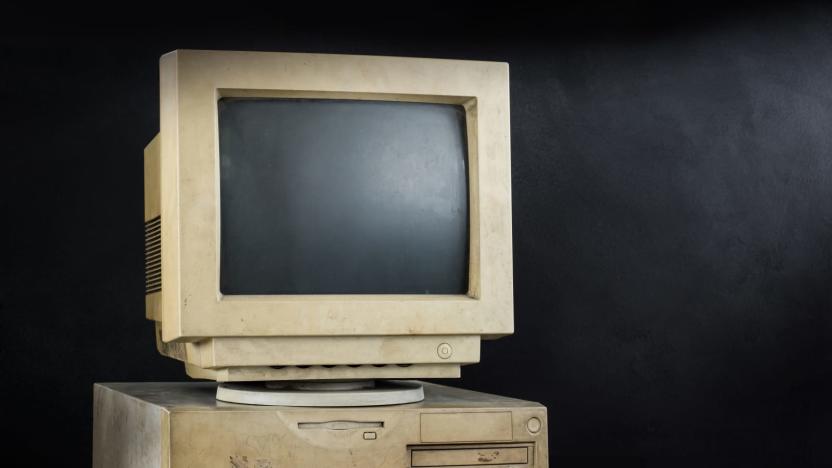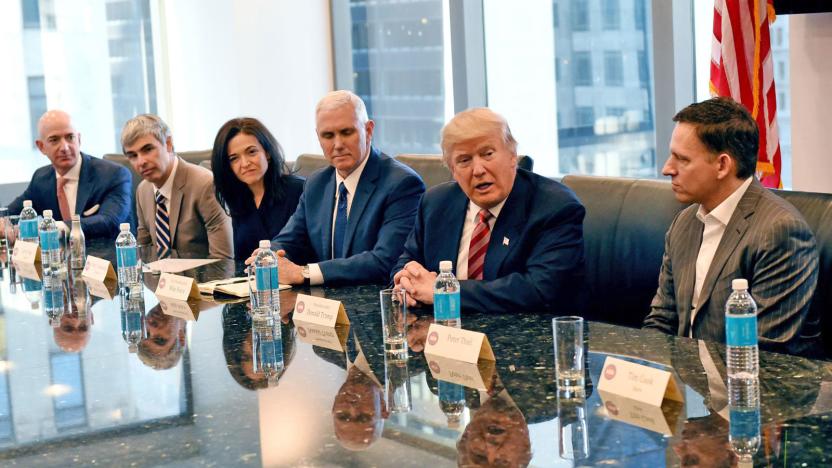EntertainmentSoftwareAssociation
Latest

For the people in the back: Video games don't cause violence
Video games do not cause violent behavior. There is no scientific, consensus-backed research supporting the idea that playing video games -- even bloody, realistic shooters -- leads to real-life acts of brutality. However, this misguided theory prevails. After a shooting at a high school in Parkland, Florida, left 17 people dead on February 14th, a handful of politicians decried video games for corrupting young minds and inciting violent behavior. Days later, President Donald Trump said during a meeting about safety in schools, "I'm hearing more and more people say the level of violence on video games is really shaping young people's thoughts." Tomorrow, video game industry leaders are scheduled to meet with Trump to discuss the (non-existent, completely imaginary) problem. The Entertainment Software Association will be there and it has a clear message for the White House: "Video games are plainly not the issue: entertainment is distributed and consumed globally, but the US has an exponentially higher level of gun violence than any other nation."

The ESA says preserving old online games isn't 'necessary'
The video game industry as a whole does a poor job of preserving its history -- especially when it comes to online games. The Entertainment Software Association -- responsible for E3; counts Electronic Arts, Sony, Microsoft, Nintendo and Ubisoft as members -- is petitioning the US Copyright Office to not make DMCA exemptions for abandoned online multiplayer games. It's an effort to block the folks at the Museum of Art and Digital Entertainment in California who would like to see an exemption made to how the DMCA treats titles like the original Everquest.

E3 will 'officially' open to the public this year
E3 has traditionally been a media-only event -- at least in theory. But starting in 2017, you won't even need a WordPress account to get access to the latest and greatest in gaming. The Entertainment Software Association, which organizes the event, announced on Wednesday that it is reserving 15,000 tickets for the general public to attend the show. Each pass will cost $250 ($150 if you buy it before next Monday, February 13th) but they'll grant you access to the show floor, panel discussions and other stuff from Tuesday to Thursday of E3.

Game developers take a stand against Trump's immigration ban
The opposition to the Trump administration's immigration ban has spread far and wide. Video game developers are joining the chorus against what some see as an unconstitutional policy put forth with no thought or consideration of the outcome. For a number of studios, that means making donations to the American Civil Liberties Union (ACLU), the non-profit organization that successfully challenged the ban in court over this past weekend.

More tech CEOs speak out against Trump's immigration order
More tech leaders have voiced opposition to Trump's immigration policy, including Amazon CEO Jeff Bezos, who attended the President's tech summit just a month ago. Bezos said that Amazon has contacted congressional leaders, reached out to the new administration, and is backing state government in a lawsuit. "Our legal team has prepared a declaration of support for the Washington State attorney general who will be filing suit against the order," Bezos wrote in an employee email. "We are working other legal options as well."

Publishers are fighting to keep abandoned games dead
The Electronic Frontier Foundation, a non-profit group that defends civil liberties in the digital world, is facing off against the Entertainment Software Association, the organization that represents most major video game publishers in the US. The EFF wants to allow players to put abandoned games back online and has asked the US Copyright Office for an exemption from the Digital Millennium Copyright Act. This would allow players to legally modify the code of online games that are no longer supported by publishers, in the hope of reconnecting these titles to new, third-party servers. This includes games like Battlefield 1942, Star Wars: Battlefront, SOCOM 4, Resistance: Fall of Man and Mario Kart Wii. Many modern games rely on servers to function; if Activision pulled the plug on Destiny, for example, even its single-player campaign would disappear, since the entire game needs an online connection.

E3 organizers set the fuzz on OUYA over parking lot cheekiness
The next-gen console war is truly on and E3 is the battleground. As IGN found out, though, fighting spirits have extended beyond the walls of the Los Angeles Convention Center, where Android console-makers OUYA and the ESA (which runs E3) are embroiled in an ongoing tussle. It started when OUYA decided to attend E3 "on its own terms," setting up a stand in a parking lot opposite the Expo to attract attention without paying E3 fees. The ESA responded by renting its own parking spaces and using trucks to obscure OUYA's stand. But for every patch, a hack is soon to follow, and OUYA then rented additional spaces in front of the trucks to put up some banners. The ESA then called the cops, who turned up on their monster Segways to see what was what. After checking OUYA's permits, the LAPD were satisfied nothing illegal was going on and split. Apparently, OUYA founder Julie Uhrman has contacted the ESA to talk it out, but hasn't received a response. Perhaps the association is too busy planning its next attack, but Uhrman is prepared: "If ten more trucks show up, we'll come up with another idea. I have a few up my sleeve." [Image Credit: IGN]

EA addresses LGBT issues in gaming in first ever 'Full Spectrum' event
At the Ford Foundation in upper Manhattan this morning, representatives from inside and outside the game industry spoke to the issues that LGBT gamers face and how best to fix them in the first ever "Full Spectrum" event. From online interactions filled with offensive language to games that don't represent LGBT relationships, those issues are myriad and varied. It's an unprecedented event, actually -- despite the wide-ranging demographics of gaming in the modern world, no such event has been held before, nonetheless hosted by one of the game industry's largest publishers (Electronic Arts teamed with the Ford Foundation and the Human Rights Campaign for today's event). As Entertainment Software Association VP of media and events Dan Hewitt reminded attendees during the first panel, the game industry is an (annual) $24 billion business that spans 50 percent of American homes, and the average gamer is 31-years-old. So why are we still seeing such an underrepresentation of diversity in gaming, despite a diversity of gamers?%Gallery-181057%

Digital games distribution earned $3.8 billion in 2010, a quarter of entire video game market
Alright, so technically all video games are digital, but what we're talking about here is the stuff that you don't buy on physical media -- downloadable games, add-on content, mobile apps, subscriptions, and gaming on social networks. That market has grown to account for 24 percent of all video game revenues in 2010, or $3.8 billion, according to the Entertainment Software Association. The ESA is the body running the currently ongoing E3 shindig, and its data comes from the NPD Group, which likes to keep a cold robotic finger on the gaming industry's pulse. Other findings in the latest ESA study include the average age of gamers (37!), the best-selling genres (action with 21.7 percent, followed by sports at 16.3 percent), and the highest-grossing games of 2010 (no prizes for guessing the warmongering winner of that one). Give the source link a bash to immerse yourself in even more gaming trivia from yesteryear.

New game industry facts, straight from the ESA
Today's "State of the Industry" E3 keynote by ESA CEO Mike Gallagher also marked the release of the organization's new annual set of "Essential Facts" about the game industry. Among the interesting findings from the ESA-commissioned survey of the American public: 65 percent of American households play computer and video games; 38 percent of American homes have a video game console; The average game player is 35 years old; One out of four gamers are over age 50; Women age 18 or older represent a significantly greater portion of the game-playing population (33 percent) than boys age 17 or younger (18 percent); 41 percent of Americans expect to purchase one or more games this year; 94 percent of parents are present when games are purchased or rented; 88 percent of parents report always or sometimes monitoring the games their children play; 63 percent of parents believe games are a positive part of their children's lives.

Wii Warm Up: If gamers are aging, should AO games be okay?
With all the recent controversy over Manhunt 2, we can't help but think that maybe it's time to relax a little when it comes to games rated AO (Adults Only). The average age of the modern gamer is rising all the time, and we all know that games are no longer just for kids. The Entertainment Software Association has some interesting statistics on just who is buying -- and playing -- games these days; according to them, 83% of all video games are purchased by someone who is over 18, and 69% of the gamers themselves are over 18. Despite the growing number of adult gamers, however, the industry still remains behind the times on the issue of mature titles. We're interested in hearing what you have to say on the issue. It's not about whether or not we think this particular game is appropriate -- we know some of you are pretty anti-violence, and we respect that. It is, however, a matter of intellectual freedom. In America, we have movies that are restricted to adults, and books and magazines that are restricted to adults ... so what's with crippling games for adults?

It's official: Lowenstein leaving ESA
It's been widely reported since late last week, but now it's official -- longtime ESA president Doug Lowenstein will be stepping down early next year, as soon as a replacement can be found.In a press release, Lowenstein said he was "honored to represent the amazing companies of the ESA, to serve as their advocate and to be part of an industry which is having such a profound and positive effect on our culture and the world of entertainment."Lowenstein's departure truly marks the end of an era. When Lowenstein joined the ESA back in 1994, the two-person organization was called the Interactive Digital Software Association and oversaw a $3 billion a year industry. Today, the ESA has 32 employees and helps support the $10 billion video game industry with a wide variety of educational and legal programs.All of us here at Joystiq are sorry to see one of the game industry's longest-serving defenders move on, and we wish him great success in his future endeavors.[Via Kotaku]

Lowenstein to leave ESA in early 2007
Entertainment Software Association President Doug Lowenstein will lose his long job title when he steps down in early 2007, according to GameSpot. It appears that he "has accepted the top position with a still-forming trade organization that would represent a consortium of retail investment firms." As the head of the ESA, Lowenstein's image was thrown in the spotlight when E3 was downsized and reborn as the E3 Media Festival. Not to mention certain anti-game activists seem to point to him whenever the industry makes a misstep (or can interpreted to have flubbed).So who will become the new president? Oft-rumored Entertainment Consumers Association founder Hal Halpin has denied interest. But don't let that stop you from voting Halpin in Game Politics' informal / unofficial poll to name the successor.

Sales of M-rated games to kids declining, reveals undercover survey
According to an undercover survey conducted by the Federal Trade Commission between October 2005 and January 2006, sales of Mature-rated games to minors have decreased significantly since 2003. The results reveal that only 42% of the survey's shoppers (ages 13 to 16) were able to purchase an M-rated title without an adult — compared to 69% in 2003. In addition, only 35% of the survey's shoppers scored an M-rated game at a national retail outlet (e.g. GameStop, EBGames, etc.). Local sellers were less strict, selling to kids 69% of the time.The survey also found that 44% of stores posted ratings information, compared to a paltry 27% three years ago. And at half of the 406 stores involved in the survey, cashiers carded kids who attempted to buy M-rated games — up from 24%. Hal Halpin, president of the Interactive Entertainment Merchants Association, concluded, "[With] the industry responding in such a visible and proactive fashion, it is clear that legislative efforts are simply not required." Amen.





